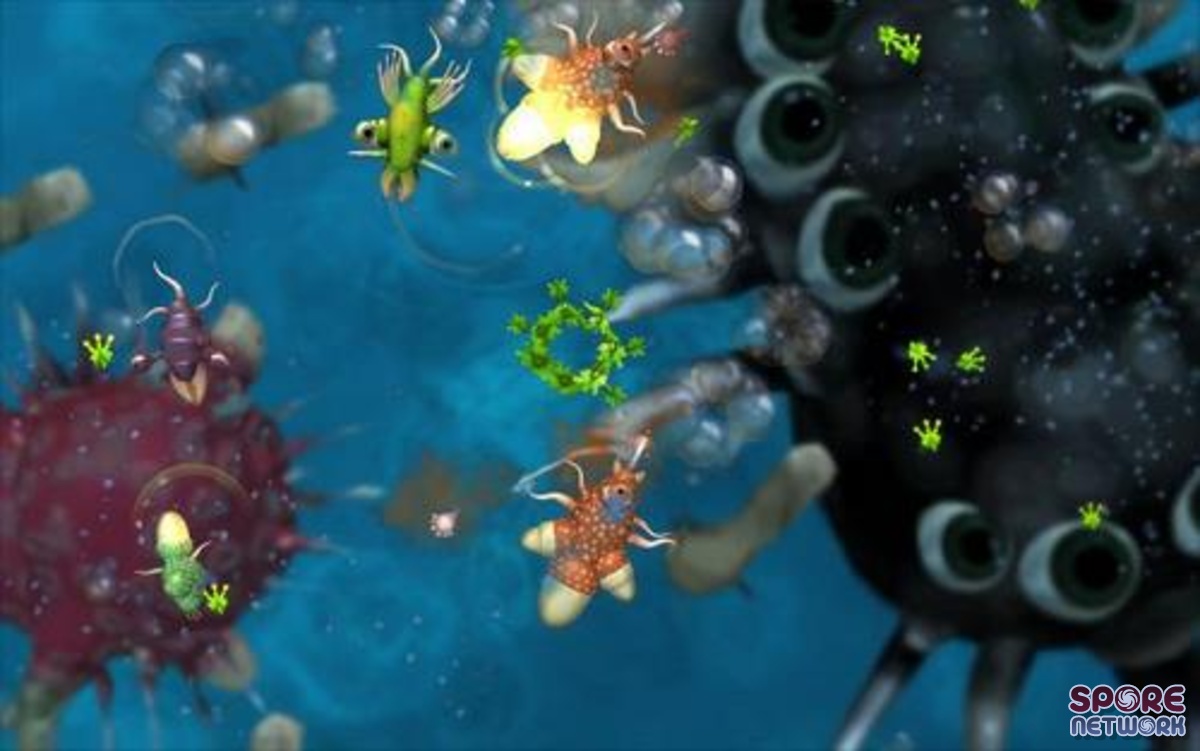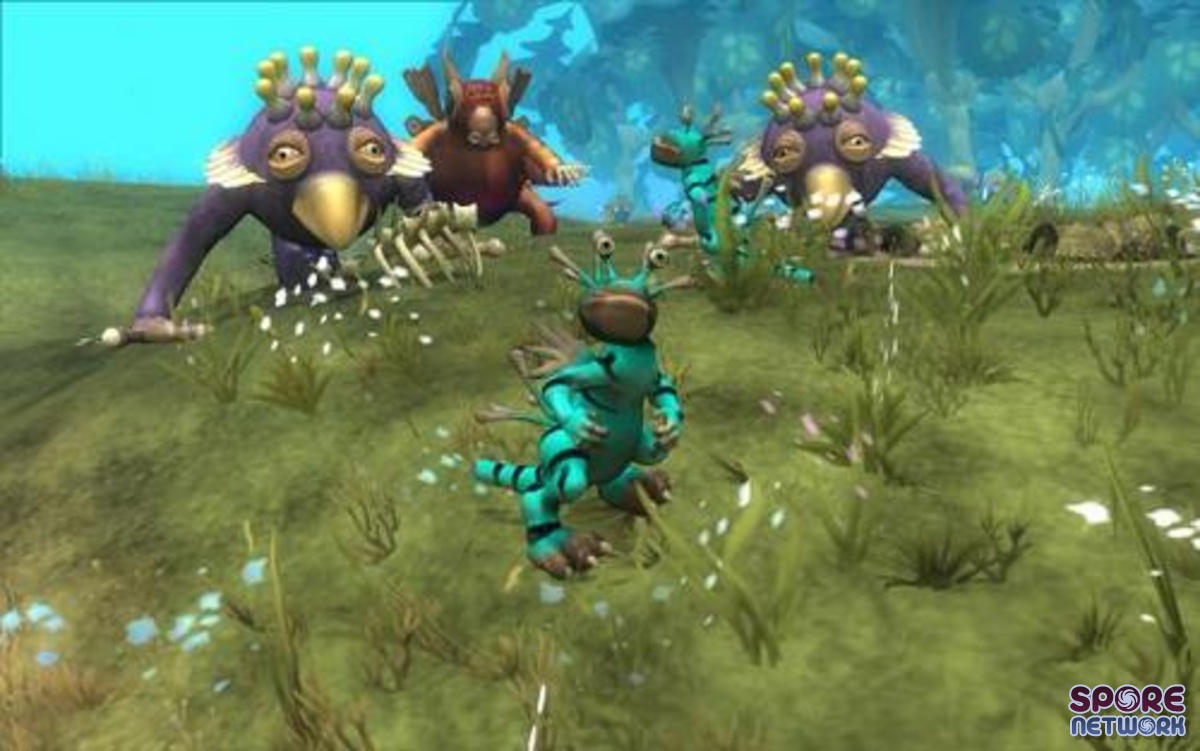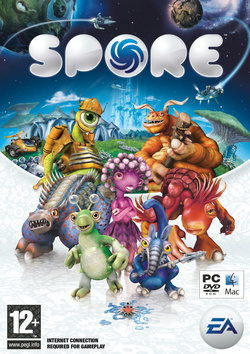Artikelen: 'Spore' Impressions Breakthrough: It's A Game After All
Spore Article at MTV Multiplayer Blog (archived version), written by Stephen Totilo.

Before last month I had already played "Spore." I'd seen it demoed twice by its creators, used the Creature Creator multiple times since 2006. I'd experienced the Big Bang of amazement many people had when I first heard the game described and felt my enthusiasm cool as the release date seemed to get ever further away.
I got the sense the game's creators were hiding something. I got the sense "Spore" was going to be less of a game than I had hoped and more of a -- their words -- "toy."
Then I got my hands on a copy of the game at EA's Los Angeles headquarters a couple of weeks ago and -- finally -- found what I was looking for.
"Spore" mostly showed well in the earlier demos I got, but the game aspect that repeatedly seemed missing was the concept of consequence of all of this evolution-based interactivity. I had expected that the choices I made in the game's "Pac-Man"-like cell stage would affect the shape of my creature in the creature stage. I thought my control of the creature stage would dictate the progress of my species in the tribe stage. And so on for the civilization stage and space stage.
During the past couple of years, I learned that each stage of "Spore" would introduce content editing tools. It seemed that player's creativity in those editing tools would dictate the progress of their creature's advance from the primordial soup to the stars, not the player's gameplay actions within the game. It seemed like "Spore" wasn't as much a game as I hoped it would be. "Spore," for better or worse, wasn't going to play like "Cubivore."

In LA two weeks ago, my impression changed. Fellow journalists N'Gai Croal and Geoff Keighley huddled with me over "Spore" creator Will Wright, who used a PC to demonstrate a couple of stages of the game and the creature timeline that tracks the progress of the species you shepherd through evolution. I'd learned about the timeline only weeks earlier and had liked what I heard. A line charts the historical progress of your creature and veers toward one of three tendencies in any of the game's first four stages. For example, in the first it will draw itself toward herbivore, carnivore or omnivore classification, depending on what you eat. The names of the three classifications change in each of the next few stages.
In the space stage, there are nine different classifications to choose to pursue. At the end of each stage, the classification you achieved rewards the species with special abilities, some of which can be used in specific stages. You might earn a dance or a better bargaining ability. I didn't learn much about the rewards, but hearing Wright flesh the idea out and explain how the way I controlled my creature would provide me gameplay rewards was just what the gamer in me wanted to hear.
(missing screen)
The Incident That Instigates The Cell Stage Of 'Spore'
After Wright finished, I sat down at the computer opposite him and started playing the initial cell stage of "Spore." I watched an opening cinematic that shows an meteorite plummeting from space and into the water where the gameplay begins. The first stage plays very much like the PC and PS3 game "flOw," requiring the player to swim their creature around a pool of food and enemies, collect a set amount and then expand into the next tier of ooze. Other than the player's own creature, the colorful cellular beings in the first stage are all created by the game's developers. It's the one part of the game that doesn't involve pollination of user-generated content. A "Spore" producer who was present told me that's because the developers want to direct the feel of the first level.
I studied my creature's progress on his timeline. It (there's no gender in "Spore") was on a path to be an herbivore. After eating enough plant life it was ready to evolve. I expected the disappointment of being sent out to the creature editor to create a whole new creature or to radically alter my own. That's not what happened. Something better did. The Creature Creator loaded, and in it floated my yellow tadpole-looking thing. And I was prompted, simply, to add legs. That's it. So simple. And so pitch-perfect. Take your creature from the last level and give it two legs. That's how you evolve in "Spore." The thing that walks around in the second of the game's levels is the thing from the first plus legs. You can immediately re-load the editor and add all sorts of other appendages, many of which are available only after you've discovered them as pick-ups in the game world. But to start a level with a creature that is physically associated with the creature of the prior level feels, as I thought "Spore" would be, like I'm playing a game with evolutionary consequence.
I'm not back to thinking "Spore" is a gamer's game. It may still prove to be more of a "toy," a plaything to see what you can create and manipulate, which isn't such a bad thing. I was told that the creature timeline was a late addition, meaning that, as much as it helps make "Spore" feel like a game to me, that "game-ness" of "Spore" doesn't seem to have been a central intent for the development team. The fact is, you can play the stages of "Spore" out of order. The limb-adding moment won't even happen if you skip the cell stage. You don't have to play "Spore" in a way that's bounded by gameplay consequence at all.
Nevertheless, two weeks ago I was able to play "Spore" not as a science project, a toy or a tech demo, but as a game. And on those merits, for me, it has finally succeeded.
"Spore" will be released on Mac and PC in North America on September 7.
(P.S. to the readers.... I didn't get a chance to play much of the game's other stages. Very, very briefly, I went into the Space Stage, launching a Pac-Man-Chasing-Dots-shaped spaceship from an Xbox 360-shaped launch pad.)











